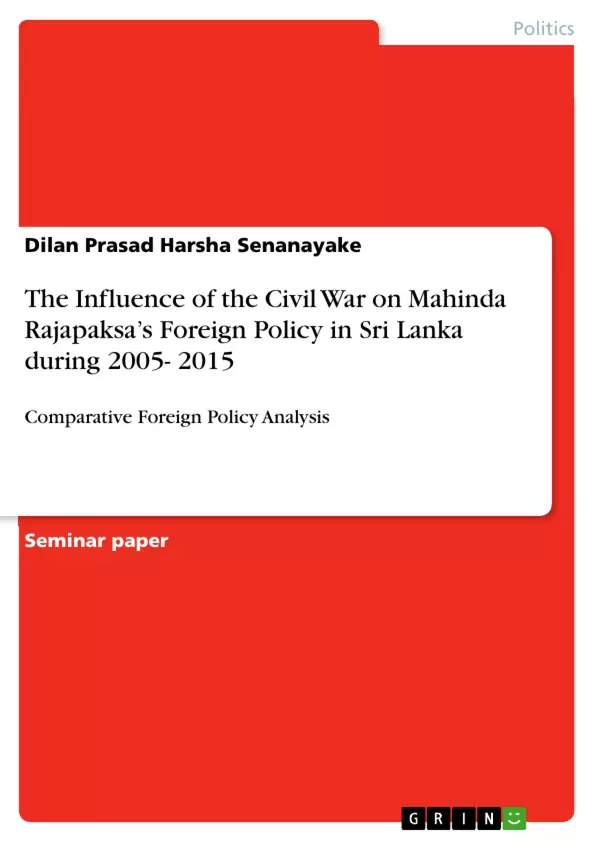Mahinda Rajapaksa elected as a fifth executive president of Sri Lanka on 19th November 2005. Rajapaksa government terminated thirty years-long civil war in Sri Lanka under the pressure of various internal and external dynamics. Mainly, the military concerns of the country directed Rajapaksa regime to formulate a strategic foreign policy to maintain the foreign relations. The government subjected to many foreign accusations including war crimes and human rights violations. Rajapaksa government exercised several foreign policy tactics to reach the world including the western world. This sporadic feature of the foreign policy shaped by the civil war influence of Sri Lanka. Rajapaksa foreign policy since 2005 to 2015 was a critical juncture of Sri Lanka’s foreign policy decision-making process. With these concerns, the research paper opens the flow of analysis on Mahinda Rajapaksa foreign and the civil war influence to Rajapaksa foreign policy formulations.
Inhaltsverzeichnis (Table of Contents)
- Introduction
- Comparative Foreign Policy Decision Making And Civil War Factor: 2005-2015
- Foreign Policy Towards SAARC Region
- Foreign Policy Toward The Western And Eastern World
- Foreign Policy Toward China
- Foreign Policy Toward The Middle East And African Region
Zielsetzung und Themenschwerpunkte (Objectives and Key Themes)
This research paper examines the influence of the Sri Lankan civil war on the foreign policy decisions of Mahinda Rajapaksa during his presidency from 2005 to 2015. It aims to analyze how the domestic political climate and the personality of the leadership shaped foreign policy decision-making, particularly in the context of the protracted internal conflict. The research focuses on the civil war's impact on Sri Lanka's foreign relations with neighboring countries, regional powers, and the Western and Eastern worlds.
- Civil war influence on foreign policy decision-making
- Sri Lanka's foreign policy objectives during the civil war
- The role of domestic political factors and leadership in shaping foreign policy
- Analysis of Sri Lanka's foreign relations with key regions and countries
- Comparative analysis of Sri Lankan foreign policy before and after the civil war
Zusammenfassung der Kapitel (Chapter Summaries)
- Introduction: This chapter sets the stage for the research by discussing the context of Mahinda Rajapaksa's presidency and the impact of the civil war on Sri Lankan politics and foreign policy. It highlights the conflicting pressures faced by the Rajapaksa government in maintaining peace while dealing with internal and external dynamics.
- Comparative Foreign Policy Decision Making And Civil War Factor: 2005-2015: This chapter delves into the decision-making process during Rajapaksa's tenure, focusing on the role of the civil war in shaping Sri Lanka's foreign policy approach. It examines the historical context, including the Indian intervention in the 1987 civil war and its implications on Sri Lanka's sovereignty.
Schlüsselwörter (Keywords)
This research paper focuses on the core concepts of comparative analysis, foreign policy, national interests, civil war, and strategic study, using Mahinda Rajapaksa's presidency and Sri Lanka's foreign policy decisions as a case study. The analysis examines the complex interplay between domestic politics, international relations, and the enduring impact of the civil war on Sri Lankan foreign policy decision-making.
Frequently Asked Questions
How did the Sri Lankan civil war influence Mahinda Rajapaksa's foreign policy?
The civil war necessitated a strategic foreign policy focused on military concerns, securing international support for the war effort, and managing foreign accusations of war crimes and human rights violations.
Why did Sri Lanka's relations with China strengthen during 2005-2015?
Faced with Western pressure regarding human rights, the Rajapaksa government turned to China for military equipment, financial aid, and diplomatic protection at the UN, leading to a significant shift in foreign alignment.
What was the impact of the 1987 Indian intervention on later policy?
The previous Indian intervention shaped a cautious and protective approach toward national sovereignty, influencing how the Rajapaksa regime interacted with the SAARC region and regional powers.
How did Rajapaksa handle foreign accusations of war crimes?
The government used various diplomatic tactics to reach the world, trying to balance relations with the Western world while simultaneously building strong alliances with non-Western regions like the Middle East and Africa.
What role did leadership personality play in Sri Lankan foreign policy?
The personality of Mahinda Rajapaksa and domestic political dynamics were crucial in moving away from traditional non-alignment towards a more assertive and strategically sporadic foreign policy during the conflict.
- Citar trabajo
- Dilan Prasad Harsha Senanayake (Autor), 2016, The Influence of the Civil War on Mahinda Rajapaksa’s Foreign Policy in Sri Lanka during 2005- 2015, Múnich, GRIN Verlag, https://www.grin.com/document/389043



